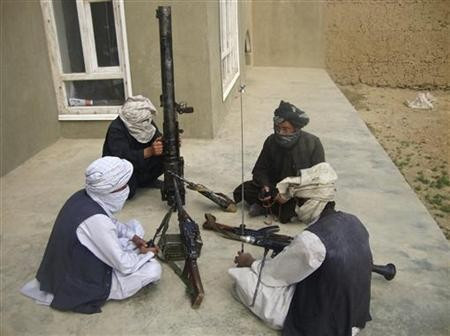Afghanistan: Will the Taliban Regain Control?

A string of attacks on high profile figure of the Karzai government has recently proven the Taliban are decided to try and regain control over Afghanistan.
In the last few weeks the confrontation between the fundamentalist goup and President Karzai has intensified, leaving the future of the country and the government uncertain.
On Thursday, six suicide bombers stormed the provincial governor's compound and the police chief's compound in Tirin Kot, capital of Uruzgan located north of Kandahar, Interior Ministry spokesman, Sediq Sediqi, said. The death role, proof of the violence of the attack, keeps on increasing and rose from 3 to 18 within an hour.
Meanwhile on Wednesday a suicide bomber killed the mayor of Kandahar city, the latest in a string of assassinations of high-profile government figures and allies of Afghan President Hamid Karzai.
Also, on July 17, gunmen killed Jan Mohammad Khan a former governor of Uruzgan and close adviser of Karzai in his home in Kabul, the country's capital, killing another official in the process.
Jan Mohamed Khan was killed only days after the killing of Ahmad Wali Karzai,the President half-brother and his closest ally in southern Afghanistan.
As NATO and the U.S. have started the withdrawal of their troops, despite official claims of the contrary, it seems increasingly doubtful that the Afghan security forces will be able to assert control over the country without the help of foreign troops.
Assassinations have now clearly become the strategy of the Taliban, which implies the group is well aware of the fallible security system and lack of training of the Afghan security forces.
Suicide bombers are also back on the headlines and have been a continuous fixture of the Taliban. According to the U.N., they have also now also started recruiting child soldiers and according to an article published in Newsweek, the worst is to come as earlier this year the Taliban's head of military operations, Mullah Abdul Qayum Zakir, allegedly ordered Taliban field commanders out of their safe havens in Pakistan and across the border into Afghanistan.
Analysts say there are a variety of reasons for the spike in Taliban attacks. "What we've seen over the past few months is an increasing tactic on both sides, [Nato] and the Taliban, to try to wage the war through targeted killings," Martine van Bijlert, of the Afghanistan Analysts Network, told the Independent.
"Partially that has an impact in the battlefield and partly on morale and partly it is also to project a certain position of strength. I would think the Taliban is trying to project presence and infiltration and penetration and staying power" she added.
Despite the Taliban claiming responsibility for most of the lasts attacks, analysts however remain cautious. Afghanistan is still divided by various factions, all struggling for power, and using the Taliban for cover might indeed be part of their tactics.
Warlords, Drug lords and criminals have fought to gain control of the area defected by the Taliban since ever the U.S. and NATO troops focused their fight on the group, and it is likely they will also try and limit its influence on what they now consider as "their territory".
Karzai little brother, Ahmad Wali Karzai was a notorious figure in the south of the country, often being accused of corruption and having links with criminal networks, which has led some observers to question who was really behind the killing.
Others however refuse to play down the Taliban's new found vigor and insist they are still a force to be reckoned with, especially in view of their new tactics.
"All indications are that the Taliban carried out all three recent assassinations. What is different is that they targeted high-profile officials rather than local administrators and police commanders. With the Taliban losing some ground in the south due to the U.S. troop surge, they have clearly shifted focus and resources to high-level assassinations. The goal of these killings like the brazen assault at the Intercontinental Hotel in Kabul is to demonstrate that the Taliban have the capability to strike anywhere at any time and to shake the confidence of Afghans in the Karzai government. They have been able to convey the image that they have the initiative, despite some NATO military gains on the battlefield, "said Mark Sedra, senior fellow at the Centre for International Governance Innovation in the Globe and Mail.
Interestingly also, recent attacks have not been directed to U.S. or NATO forces, being to difficult to target, due to heightened security, which proves that the Afghan security forces still have a long way to go before being able to fully assert their authority in the entire country.
Clearly the Taliban have decided to wage a psychological war on the Karzai regime, by terrorising officials and aspiring new recruits. With the south of the country weakened by the Taliban and their attacks, different factions fighting each other for power, and a low public support due to accusations of endemic corruption within the government, the president will have to fight extremely hard to prove he remains relevant.
© Copyright IBTimes 2025. All rights reserved.





















